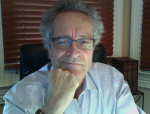Who are you and what are you doing here?
Who are you and what are you doing here?
Who are you and what are you doing here?
 So, you want to do the humanitarian thing, to treat people with respect, care, tenderness, empathy, understanding ? Good for you. Good for us. Good for ISEPP. Somehow, though, I think there is more to it than that.
So, you want to do the humanitarian thing, to treat people with respect, care, tenderness, empathy, understanding ? Good for you. Good for us. Good for ISEPP. Somehow, though, I think there is more to it than that.
I am an existential psychiatrist; we are a crusty lot. Our favorite subjects are:
You wonder why we need a drink at the end of the day?
“Yes, Mrs. Smith, you have a disease, an illness, a syndrome. We call this condition `being human`.” Some would say just “being,” but believe me (take care when someone starts his spiel with “believe me”) being human is special. I love dogs, cats, elephants, and Orca whales, but my best bet is they don’t think about the same things as I think about. OK, there is some overlap. They think about sex (at the appropriate time) and I think about sex any time. I think I am the center of the universe, all revolves around me and those creatures seem to share my self-centeredness. They do what they do to survive. So do I. Still, truly we humans are different. Why do I care about the Rohingya genocide in Burma or anti-women culture in Saudi Arabia? Why do I espouse such liberal taunts as “An injustice anywhere is an injustice everywhere?” Why do I care what is Dark Matter and Dark Energy? Why do I ask “why” so often? To be an existentialist is to take responsibility for my actions and my being even though I had nothing to say about “joining up” to life. Why do I seek meaning when clearly it is out of reach? Why am I capable of loneliness in a crowd? Why do I fear death in the midst of so much life?
Recently I read an interesting idea about cancer, the title of the article, “Why did God create cancer?” (Tedd Koren, Wise Traditions, Fall 2017, p 16, Vol 18, No. 3). The author gives a teleological explanation for cancer. Note: doctors are taught in medical school not to do this...not to think teleologically. A teleological explanation attempts to explain the purpose of a phenomenon rather than its cause. Koren’s argument: malignancies are not the problem but the body’s attempt at a solution to cleansing the body of toxic substances such as pesticides and heavy metals. He cites Devra Davis’ work (“The Secret History of the War on Cancer”, NY, NY. Basic Books, 2001) which explicates the profoundly increased number of malignancies in toxic environments. Dr. Davis also makes the case, unfortunately, that the so called War on Cancer actually followed the commercial interests of industry rather than the health of the populace. Also, Koren cites studies (Falck, F. Jr. et al. “Pesticides and polychlorinated biphenyl residues in human breast lipids and their relation to breast cancer. Arch Environ Health 1992; 47(2): 143-146. ) showing the heavy concentrations of toxins within cancers themselves. Oncologists miss the boat, he posits, as they focus on killing tumors which are the body’s filtering system. They should be focusing, instead, on detoxifying the person.
------
Back to the original question, “Who am I, the existential psychiatrist, and what am I doing with this endeavor called “psychotherapy?” Perhaps we can think of psychotherapy as a kind of “filtering” system where the therapist in partnership with the patient filters out the toxicities within relationships: Interpersonal and intrapersonal relations and the person’s relationship to his environment. The existential therapist also focuses on relationship to being itself. And, for good measure, the existential psychoanalyst focuses on relationship to the past.
Continuing with this metaphor: The biological psychiatrist is more like the current purveyors of oncology. The oncologist focuses on killing the tumor with toxic drugs, surgery, and radiation: slash, poison, burn. The biological psychiatrist attempts to kill symptoms with drugs and ECT. What I am positing is this: The symptoms of mental and interpersonal anguish, depression, anxiety, delusions, hallucinations are the organism’s (the person’s) attempt to deal with, to cope with, to cleans, to filter, toxic-difficult conflict. The therapist is there to encourage and enhance this process, not kill it. We need more than empathy to do that. It also takes courage.

0 Comments